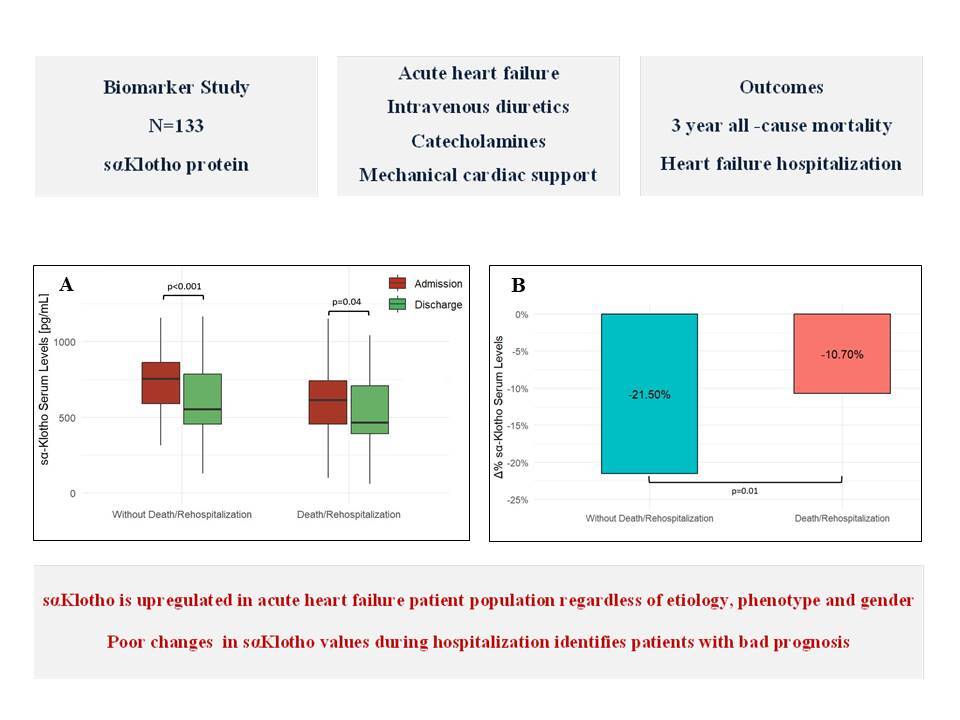Current issue
Archive
Manuscripts accepted
About the Journal
Editorial office
Editorial board
Section Editors
Abstracting and indexing
Subscription
Contact
Ethical standards and procedures
Most read articles
Instructions for authors
Article Processing Charge (APC)
Regulations of paying article processing charge (APC)
HEART FAILURE / RESEARCH PAPER
sαKlotho protein is a useuful biomarker and a promising cardioprotective agent in acute heart failure
1
Department of Cardiology, University Hospital, Institute of Medical Sciences, University of Opole, Poland
2
Department of Medical Laboratory Diagnostics, Division of Clinical Chemistry and Laboratory Haematology, Faculty of Pharmacy, Wrocław Medical University, Poland
3
Department of Clinical Biochemistry and Laboratory Diagnostics, Institute of Medical Sciences, University of Opole, Poland
4
University Hospital of Opole, Poland
Submission date: 2024-04-25
Final revision date: 2024-07-31
Acceptance date: 2024-08-12
Online publication date: 2024-09-07
Corresponding author
Joanna Płonka
Department of Cardiology, University Hospital, Institute of Medical Sciences, University of Opole, al.Witosa 26, 45-401, Opole, Poland
Department of Cardiology, University Hospital, Institute of Medical Sciences, University of Opole, al.Witosa 26, 45-401, Opole, Poland
KEYWORDS
TOPICS
ABSTRACT
Introduction:
Acute heart failure (AHF) is a heterogeneous and etiologically complex syndrome with bad prognosis. sαKlotho (sαKL) is an antiaging protein with pleiotropic actions. The aim of the study was to assess the level and kinetics of sαKl during an episode of AHF and its long-term prognostic utility in population of AHF patients.
Material and methods:
It was a prospective multicenter study, which enrolled 133 participants. 112 consecutive patients were admitted to the intensive cardiac care unit with diagnosis of AHF (age 68[IQR,60-75] years, ejection fraction 30%[IQR,20-38], new-onset AHF 46% of the population). 21 individuals consisted the control group. sαKl, N-terminal pro-B-type natriuretic peptide (NT-proBNP) were determined in serum at admission and at discharge. The main clinical outcomes assessed in the study were 3 year all-cause mortality or HF rehospitalization.
Results:
sαKl concentration significantly increased during episode of AHF. A weak negative correlation was observed between sαKl and NT-proBNP at admission and discharge. Only patients with ischemic etiology of AHF did not have considerably elevated sαKl values at admission. Both, women and men had similar values of biomarker. Smoking did not affect sαKl in our study. Patients who developed the combined endpoint during 3 year follow-up presented poor increase in sαKl values on admission compared to control group (p=0.169) and weak biomarker kinetics during hospitalization as compared with group free of outcomes (p=0.01).
Conclusions:
sαKl level is upregulated during an acute episode of HF and may acts as a useful biomarker. Weak reduction in sαKl levels during treatment indicate patients with poor long-term prognosis.
Acute heart failure (AHF) is a heterogeneous and etiologically complex syndrome with bad prognosis. sαKlotho (sαKL) is an antiaging protein with pleiotropic actions. The aim of the study was to assess the level and kinetics of sαKl during an episode of AHF and its long-term prognostic utility in population of AHF patients.
Material and methods:
It was a prospective multicenter study, which enrolled 133 participants. 112 consecutive patients were admitted to the intensive cardiac care unit with diagnosis of AHF (age 68[IQR,60-75] years, ejection fraction 30%[IQR,20-38], new-onset AHF 46% of the population). 21 individuals consisted the control group. sαKl, N-terminal pro-B-type natriuretic peptide (NT-proBNP) were determined in serum at admission and at discharge. The main clinical outcomes assessed in the study were 3 year all-cause mortality or HF rehospitalization.
Results:
sαKl concentration significantly increased during episode of AHF. A weak negative correlation was observed between sαKl and NT-proBNP at admission and discharge. Only patients with ischemic etiology of AHF did not have considerably elevated sαKl values at admission. Both, women and men had similar values of biomarker. Smoking did not affect sαKl in our study. Patients who developed the combined endpoint during 3 year follow-up presented poor increase in sαKl values on admission compared to control group (p=0.169) and weak biomarker kinetics during hospitalization as compared with group free of outcomes (p=0.01).
Conclusions:
sαKl level is upregulated during an acute episode of HF and may acts as a useful biomarker. Weak reduction in sαKl levels during treatment indicate patients with poor long-term prognosis.
Share
RELATED ARTICLE
We process personal data collected when visiting the website. The function of obtaining information about users and their behavior is carried out by voluntarily entered information in forms and saving cookies in end devices. Data, including cookies, are used to provide services, improve the user experience and to analyze the traffic in accordance with the Privacy policy. Data are also collected and processed by Google Analytics tool (more).
You can change cookies settings in your browser. Restricted use of cookies in the browser configuration may affect some functionalities of the website.
You can change cookies settings in your browser. Restricted use of cookies in the browser configuration may affect some functionalities of the website.



